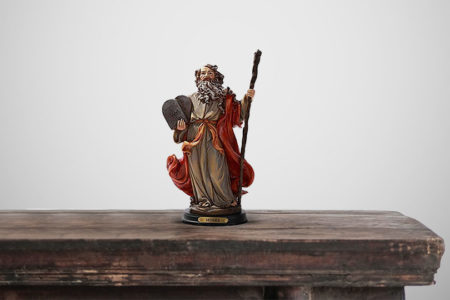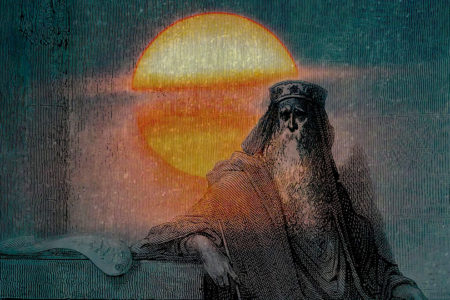When the Grinders Cease Eccl. 10-12
When the body fails and the eyes grow dim, we start evaluating our lives. That’s what King Solomon did, and here is his conclusion.
Have you ever met someone who claims to be an existentialist? I have, and it was an encounter I’ll never forget.
Existentialism is an atheistic philosophy that claims individuals are free and responsible agents who determine their own development through acts of the will. A young man I met many years ago believed people assign their own meanings to life as they attempt to make wise, rational choices in an irrational world.
As we talked, I prayed the Lord would help me transition our discussion to the Bible—and that’s when Ecclesiastes came to mind. I asked him if he had ever read the Bible. He said he had read small portions of it. “Have you ever read the book of Ecclesiastes?” I asked him. He had not.
Ecclesiastes is highly philosophical, and its greatest strength lies in its last two chapters, which I began to share with this young man. “Remember now your Creator in the days of your youth” (12:1).
King Solomon had been imparting wisdom about life and death: “Truly the light [life] is sweet, and it is pleasant, . . . but if a man lives many years and rejoices in them all, yet let him remember the days of darkness [death]” (11:7–8).
We were created by God, and our Creator wants us to enjoy our lives as much as possible. But we must remember that our time on Earth is limited, and we must live responsibly. When we’re young, we feel invincible. We think our lives will never end. But the reality of life is “vanity” (v. 10), or as theologian Dr. Charles Ryrie suggested, “transitory, fleeting.”1
Solomon urged everyone to remember the Lord before youth fades, health fails, and death looms large—“before the difficult days come, and the years draw near when you say, ‘I have no pleasure in them’ . . . and the clouds do not return after the rain” (12:1–2). Solomon suggested that failing health and old age come as quickly as a storm.
TOO SOON OLD, TOO LATE SMART
Other analogies in Ecclesiastes also describe advancing age and its struggles. Solomon paralleled old age with an old house (v. 3). The phrase the keepers of the house tremble (v. 3) seems to refer to our arms and hands that once were steady and strong but may begin to shake with age.
The phrase the strong men bow down (v. 3) alludes to the weakness in our legs that arrives with advanced age. When we’re young, we walk and run. But when we grow old many of us need canes, walkers, or even wheelchairs. Verses 3–5 poetically portray the failing of our bodies:
Grinders cease because they are few, and those that look through the windows grow dim; when the doors are shut in the streets, and the sound of grinding is low, when one rises up at the sound of a bird, and all the daughters of music are brought low. Also they are afraid of height, and of terrors in the way; when the almond tree blossoms, the grasshopper is a burden.
“Grinders” suggest the loss of teeth, while the phrase the windows grow dim addresses failing eyesight. We also lose other functions like hearing, flexibility, and the ability to sleep soundly.
As we age, we may look back on our lives only to discover, as my dear friend Myer told me after he received Christ in his 80s, “We are too soon old and too late smart.” So we must remember our Creator when we’re young, before everything begins to fail, our bodies deteriorate, and we lose our memories or pass from this life into the next: “For man goes to his eternal home, and the mourners go about the streets” (v. 5).
Solomon used the phrases the silver cord is loosed, the golden bowl is broken, the pitcher shattered at the fountain, and the wheel broken at the well (v. 6) to picture physical death. “Then the dust will return to the earth as it was” (v. 7).
In the Garden of Eden after man’s fall, God told Adam he would “return to the ground, for out of it you were taken; for dust you are, and to dust you shall return” (Gen. 3:19). We were not created to die, but old age and death crash in on us because of sin. Solomon must have understood this fact well because when he was younger, he forsook the Lord: “Solomon loved many foreign women . . . from the nations of whom the LORD had said to the children of Israel, ‘You shall not intermarry with them. . . . Surely they will turn away your hearts after their gods’” (1 Ki. 11:1–2).
As old age relentlessly pursued him, he no doubt realized how foolish his choices had been. So he advised others not to make the same mistakes and to remember God while they were young and to make wise choices. As the apostle Paul wrote, “‘In an acceptable time I have heard you, and in the day of salvation I have helped you.’ Behold, now is the accepted time; behold, now is the day of salvation” (2 Cor. 6:2). Now is the time to get right with God and follow Him.
Myer once asked me why I was so determined to share the gospel with him.
“Why?” he asked. “Why me? Why is this so important?”
I shared with him the final words of wisdom from Ecclesiastes:
Let us hear the conclusion of the whole matter: Fear God, and keep his commandments: for this is the whole duty of man. For God shall bring every work into judgment, with every secret thing, whether it be good, or whether it be evil (12:13–14, KJV).
I knew the judgment that lay ahead for him if he rejected Jesus.
Because we are God’s creation, we belong to Him. He has told us, “The soul who sins shall die” (Ezek. 18:20). Paul rephrased that Hebrew Scripture when he said, “For all have sinned and fall short of the glory of God” (Rom. 3:23). If we remain in our sinful states, we’re doomed: “For the wages of sin is death” (6:23)—meaning eternal separation from God.
I wanted to see Myer accept Christ as his personal Savior so that his sins would be forgiven and he would be with the Lord when he died. The thought of him suffering for eternity in the Lake of Fire tormented me.
Myer accepted Christ as his Savior that night, while alone in his bedroom. He called me the next morning with the news. What a difference Christ made in his life!
Someday we’ll all stand before God, just as Solomon wrote. And everything we’ve ever said or done will be judged. The author of the book of Hebrews stated, “It is appointed for men to die once, but after this the judgment” (9:27). Solomon understood that when we die, “the spirit will return to God who gave it” (Eccl. 12:7).
I shared this fact with the young man to whom I was speaking. Existentialism believes the only way to embrace the vanity of life is by embracing existence on Earth. Solomon said it is by embracing the Lord.
“You see,” I said, “your soul will return to God for judgment if you reject Him. But it will return to enjoy Him forever if you love Him.”
The young man replied, “I’m going to read that book.”
To this day, that encounter 34 years ago was the only time I’ve ever used Ecclesiastes to teach a complete stranger about God. I pray today that gentleman knows the Lord.
ENDNOTE
-
- Charles C. Ryrie, Ryrie Study Bible, NKJV (Chicago, IL: Moody Press, 1985), 1,017, n Eccl. 11:10.









Thank you for your teaching, no one ever encouraged me about the Bible, but I saved a Bible from being thrown away, and the woman that was going to throw my Bible away, tore out Amos chapter two and Romans chapter ten, and when she told me that, I asked her aren’t you afraid?. She said of what,? I said of God for throwing away those pages,? She was indignant about her actions. But a couple year’s later, God saved me, and it was because I wanted to know the truth and I opened the Bible, King James version. But today I am going through a lot of tribulation and lack the knowledge,to talk to my roommate about God.
I am doing a leadership type teaching about Solomon for a men’s bible study tomorrow morning. Any resources you can suggest would be helpful. Thank you for your article. May the Lord God bless you as you continue to fear Him and obey His commandments.
Greetings Tom!
I enjoyed your article very much. (I enjoy all your articles)
Ecclesiastes 12:13 – one of my favorite verses in the Bible.
Thank you for all you do for Yeshua Hamashiach.
Shalom (Numbers 6:24-26),
Paul